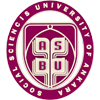 About Undergraduate Program
About Undergraduate Program
The undergraduate curriculum at ASBU includes both departmental and non-departmental elective courses from a wide spectrum of disciplines apart from basic courses such as microeconomics, macroeconomics, public finance, and monetary policy. In line with the aim of ASBU to be a research-oriented university, the department not only conveys the existing theories and ideas in economics to students but also helps them gain a perspective of doing research thanks to short-essay assignments and term projects.
 Our Difference
Our Difference
Students who study economics at ASBU are expected to
• understand economic change and make sound economic predictions by reducing complex economic issues to manageable problems,
• enhance their research, analytical, and creative abilities,
• create solutions to local, national, or global economic problems,
• have the capacity to do theoretical and empirical research in the fields they specialize,
• acquire leadership and cooperation skills. The Department of Economics aims to give a high-standard education to its students using up-to-date national/international resources and publications. Since ASBU specializes in research, all faculty members have publications in reputable national/international journals. Since our faculty members have specialized in a wide variety of fields, the courses offered are given by those whose research areas are closely related with the subjects covered in the courses. Apart from English, students at ASBU have an opportunity to learn a second foreign language. 
The Department of Economics encourages students to benefit from this opportunity. The Department of Economics supports student-exchange programs such as Erasmus, Farabi and Mevlana.

Job Opportunities
Graduates with a bachelor's degree in economics are able to follow an academic career. Alternatively, they can seek to be employed by private firms, public institutions, or regulatory bodies after obtaining their degree. In these institutions, they can work as economists, bank managers, chartered accountants, or economics specialists in ministries. Some institutions where graduates can find a job are listed below.
• Treasury
• Ministry of Finance
• Ministry of Economy
• The Central Bank
• Turkish Competition Authority
• Capital Markets Board
• Financial institutions
• Public and private banks
• Public and private firms

